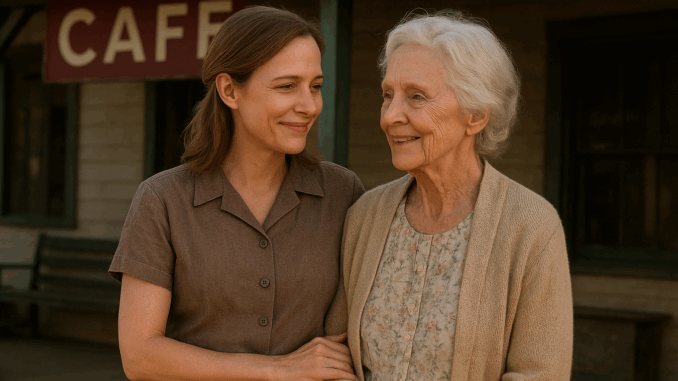
Few film endings linger quite like the final scene of Fried Green Tomatoes. It’s quiet yet deeply emotional — a moment filled with nostalgia, mystery, and warmth that perfectly encapsulates the movie’s heart. Decades later, viewers still debate what really happened and what the ending means. Let’s break down its details and the lasting symbolism behind it.
1. Ninny’s Revelation: The Past and Present Collide
As the story concludes, Evelyn Couch (Kathy Bates) drives Ninny Threadgoode (Jessica Tandy) back to Whistle Stop after Ruth Jamison’s death. Ninny reminisces about the past, weaving together decades of love, friendship, and heartbreak. Her stories have transformed Evelyn — from a timid housewife into a confident, compassionate woman.
The key revelation comes when Evelyn discovers Ruth’s grave next to one marked for Idgie Threadgoode. This discovery reignites a long-standing question: Was Ninny actually Idgie all along? The film never explicitly answers, leaving the mystery intentionally unresolved.
This deliberate ambiguity allows viewers to interpret Ninny as both storyteller and spirit — a bridge between past and present. Whether she is Idgie or not, her memories keep the love between Ruth and Idgie alive, turning the film’s history into living legend.
2. The Return to Whistle Stop Café
In the film’s closing moments, Evelyn visits the Whistle Stop Café one last time. There, she finds a small offering of food and a note signed “Love, Idgie.” The message, “The secret’s in the sauce,” is both playful and profound.
On the surface, it recalls the running joke that Frank Bennett — Ruth’s abusive husband — might have been served in the café’s famous barbecue. But on a deeper level, it’s a metaphor for love, compassion, and resilience — the “secret ingredients” that hold communities together.
This detail transforms the ending from eerie to uplifting: the idea that Idgie’s spirit (or her legacy) still watches over Whistle Stop, ensuring the café and its values of kindness and courage never fade away.
3. The Symbolism of the Ending
The ending of Fried Green Tomatoes isn’t about death — it’s about endurance. Every element carries symbolic meaning:
- The Graveyard: A symbol of closure and memory. Ruth and Idgie’s graves side by side reflect eternal companionship.
- The Café: A symbol of community and belonging. It’s where stories are shared and love is expressed through food and laughter.
- The Note: A message of continuity. It reminds Evelyn (and the audience) that stories — and the people within them — never truly die if they’re remembered.
The film closes with Evelyn embracing Ninny, saying, “I miss her too.” This emotional exchange bridges generations, showing how storytelling transforms grief into gratitude and loss into connection.

4. The Deeper Message: Love Beyond Time
Ultimately, the ending of Fried Green Tomatoes is about timeless love — not confined to romance, gender, or even mortality. Ruth and Idgie’s relationship, rooted in devotion and courage, continues to inspire long after their lives end. Evelyn becomes their living legacy, carrying forward their spirit of independence and compassion.
The film suggests that true love — in any form — never fades. It changes shape, lives on through memory, and finds new ways to exist.
5. Why the Ending Still Resonates Today
More than 30 years later, audiences still return to Fried Green Tomatoes for comfort and inspiration. Its ending reminds us that love, kindness, and courage can outlast tragedy. The ambiguity doesn’t confuse — it comforts, allowing each viewer to find their own truth in it.
In a world that often demands certainty, Fried Green Tomatoes ends with a whisper rather than a shout: a message tucked into a simple note, a smile through tears, and the reminder that “the secret’s in the sauce” — in other words, in the love we give and the lives we touch.
